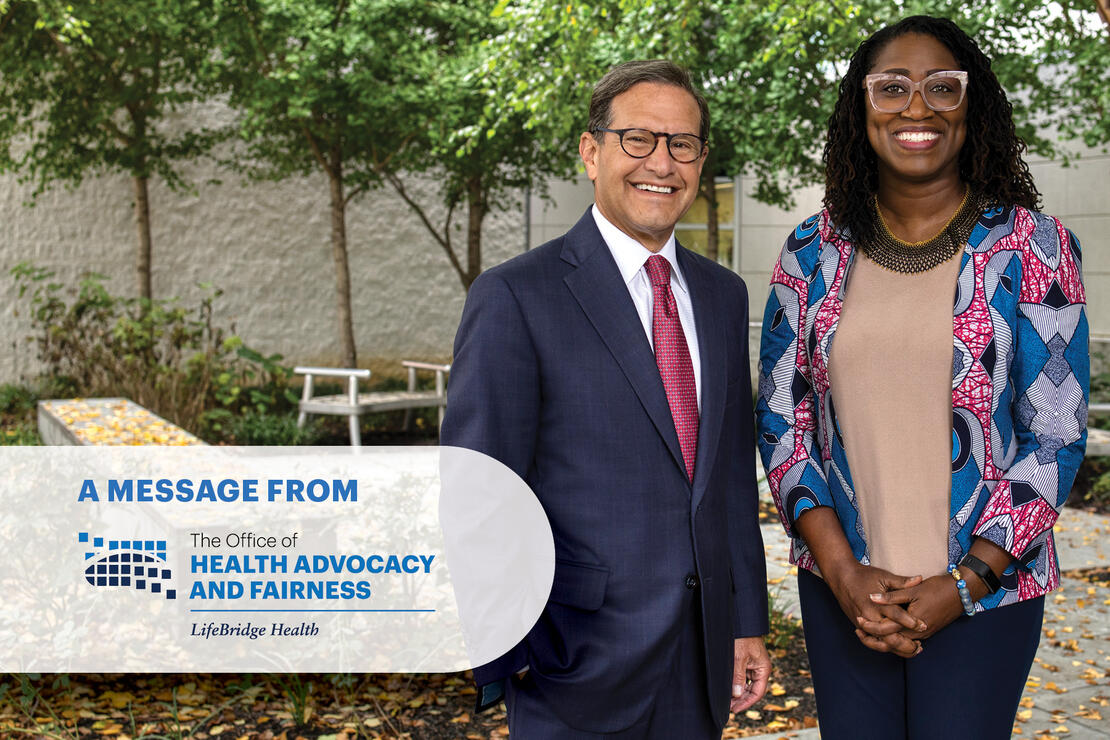A Message From the Office of Health Advocacy and Fairness - June 2025

At LifeBridge Health, our commitment to fairness, belonging and compassionate care remains strong as we adapt to a changing healthcare landscape. This month and beyond, the Office of Health Advocacy and Fairness will continue supporting employee resource groups, advancing equity through our councils and creating a culture where everyone feels valued.
To that end, we join you in recognizing the observances and celebrations that reflect the diversity, values and lived experiences of our team members, patients and communities.
Pride Month
June is Pride Month, dedicated to the LGBTQIA+ community. Pride Month finds its origins in the Stonewall Riots of 1969, during which members of the LGBTQIA+ community rose up in protest against police raids at the Stonewall Inn, a New York City gay bar. Pride Month is a time for members of the LGBTQIA+ community to celebrate themselves and each other, relishing the joy and fulfillment that comes with living in truth. Pride is celebrated with vibrant parades throughout cities across the United States and the world.
Caribbean American Heritage Month
Caribbean American Heritage Month honors the rich history of Caribbean people in the United States. Caribbean Americans are immigrants or the ancestors of immigrants from Caribbean nations such as Cuba, the Dominican Republic, Jamaica and Haiti. The influence of Caribbean people on American life is incalculably vast, due in part to the cultural contributions of seminal figures such as W.E.B. DuBois, Sidney Poitier, Shirley Chisholm and Kwame Ture, and many others. We offer in gratitude and celebration our warmest regards to all Caribbean American patients and team members at LifeBridge Health.
American Indian Citizenship Day (6/02)
On June 2, 1924, the Indigenous people of the United States were granted full U.S. citizenship with the passing of the Indian Citizenship Act. Indigenous people were not given the right to vote, however, until 1958 and remain subject to a host of social and political inequities here on their own ancestral land. June 2 serves as an opportunity to honor the proud history and culture of native people while acknowledging the injustices to which they have been subjected.
Juneteenth (6/19)
Observed on June 19, Juneteenth commemorates the emancipation of enslaved African people in the United States. On June 19, 1865, 250,000 slaves in Galveston, Texas were informed of their freedom, over two years after the signing of the Emancipation Proclamation. Juneteenth became a federal holiday in 2021, amidst a fever pitch of public consciousness surrounding racism against African American people. Juneteenth is an occasion for both celebrating freedom and reflecting on the racial inequities and discrimination still perpetrated against Black people in the United States. Juneteenth festivities include gatherings with family and friends, parades, musical performances and more. We wish all African American team members a happy and fulfilling Juneteenth and encourage all allies to use the holiday as an opportunity for learning.
Helen Keller Day (6/27)
Observed on June 27, Helen Keller Day commemorates the life and achievements of its namesake. Born in 1880, Keller lost both her hearing and sight due to illness as a child. Keller would eventually learn how to both read and write, becoming in adulthood a prolific author and disability rights activist. She was the first deafblind person in American history to earn a Bachelor of Arts degree. In addition to celebrating Keller’s legacy, Helen Keller Day draws attention to advocacy efforts for blind and deaf people.
Calls to Action
- Reflect. Take a moment to consider your role in creating a safe, respectful and inclusive healthcare environment. Reflect on your own assumptions, behaviors and the ways in which you contribute to a culture of equity and trust — with patients, colleagues and the community.
- Recognize. Acknowledge the diverse experiences and challenges faced by both patients and team members. Recognize moments where bias, injustice or inequity may be present — and where your awareness can make a difference.
- Respond. Take action. Speak up when something isn’t right. Practice inclusive behaviors in your everyday work. Support systems, programs and policies that advance fairness and health equity for all.